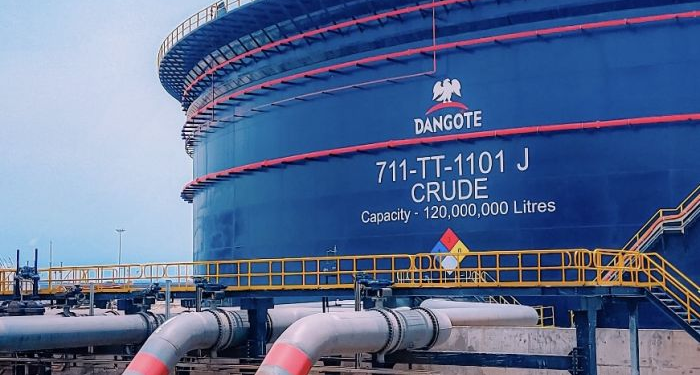Naira-for-crude policy: Another gimmick or game-changer in Nigeria’s oil sector

Photo used for Story Illustration: Dangote-Refinery: Photo Credit: Nairametrics
The Naira-for-Crude policy, introduced on October 1, 2024, aimed to address the country’s long-standing oil importation challenges.
The policy allows domestic refineries to purchase crude oil in Naira instead of U.S. dollars, aiming to reduce foreign exchange pressure, boost local refining, and strengthen energy security.
Now, six months later, the Naira-for-Crude policy is back in the headlines. A few days into April 2025, the federal government reiterated its commitment to the initiative, announcing that it was finally set to begin full implementation. The renewed focus came as part of a broader effort to cut down Nigeria’s forex outflows by 30–40%, improve domestic energy security, and support local industrialization.
Government officials framed it as a bold step toward energy independence. For instance, Finance Minister Wale Edun highlighted that direct purchasing would foster a competitive market and streamline the supply chain. but on the ground, realities continue to raise doubts about the sincerity and readiness of the implementing bodies because well-intentioned policies often make headlines in Nigeria but fail to have a lasting impact.
The Dangote Refinery Case Study
The implementation of the Naira-for-Crude policy has hit a significant roadblock in the case of the Dangote Refinery, which was one of the key players expected to benefit from the policy. Under an agreement with the NNPC, the company was promised a regular supply of 300,000 to 400,000 barrels of crude oil per day (bpd) of crude oil.
By February 2025, the NNPC had only delivered two cargoes, totaling 950,000 barrels for the entire month, far from the agreed quantity. This failure forced Dangote to source crude oil from the United States and Brazil to meet refinery demand, undermining the policy’s objectives.
Read Also:
From grace to grass? How Dangote Refinery’s trouble started
A Pattern of Policy–Practice Gap in Nigeria
The challenges surrounding the Naira-for-Crude policy follow a troubling trend in Nigeria’s oil and gas sector, where well-crafted policies often collapse under the weight of poor execution, bureaucratic inefficiencies, or vested interests. As a marketer quoted in the Daily Trust article succinctly put it, “Announcing a policy is one thing, implementing it is another.”
A notable example is the Petroleum Industry Bill (PIB), first introduced in 2008; the bill spent over a decade in legislative limbo before finally being passed in 2021. Yet, several aspects of its implementation remain incomplete or contested, including the unbundling of the NNPC and regulatory independence.
Another key example is the ongoing promise to revitalize Nigeria’s local refineries. The current administration, which came into power in 2023, announced bold plans to restart and upgrade the country’s long-neglected refineries, including the Port Harcourt, Warri, and Kaduna refineries. However, despite the grand promises, no tangible progress has been made, refineries remain in disrepair, and Nigeria still relies heavily on imported fuel.
After Nigerian government’s efforts to revitalise its local refineries, it has faced significant challenges. substantial financial commitments, tangible progress has been limited
For instance, in 2021, the Federal Executive Council approved $1.5 billion for the rehabilitation of the Port Harcourt Refinery, aiming to restore its functionality and reduce reliance on imported fuel. Similarly, in August 2021, approximately $1.48 billion was allocated for the rehabilitation of the Warri and Kaduna refineries.
These examples underscore that Nigeria does not lack policy ideas; it lacks consistent, transparent, and accountable execution mechanisms. The disconnect between official declarations and follow-through has become a hallmark of the system, weakening public trust and discouraging private sector confidence.
Read Also:
Dangote refinery reduces fuel price…here’s what to know
Other Consequences of Poor Implementation
The gap between policy announcements and execution in Nigeria’s oil sector has significant repercussions such as:
Loss of Investor Confidence: Inconsistent policy implementation, like the Naira-for-Crude failure, deters foreign investment. Investors view Nigeria as unreliable, hesitant to fund long-term projects in a volatile environment.
Waste of Public Funds: Billions allocated to projects like refinery rehabilitation have yielded little progress, fostering policy fatigue among the public and eroding trust in the government’s ability to deliver on its promises.
Continued Reliance on Fuel Imports: Although there is abundant crude oil, Nigeria’s refineries remain underutilized, keeping the country dependent on costly fuel imports, which continue to strain foreign exchange reserves.
Conclusion and Call to Action
The Naira-for-Crude policy, if executed effectively, has the potential to reshape Nigeria’s oil sector and bolster its economy by promoting local refining and reducing forex pressure. However, the failure to implement similar policies in the past highlights a persistent problem: Nigeria struggles not with policy formulation but with execution.
To make this policy work, the government and the NNPC must move beyond mere announcements and focus on transparent, accountable actions. Timely execution, coupled with robust oversight, is essential for policies to deliver their intended results. Only then can Nigeria truly benefit from the Naira-for-Crude initiative and achieve long-term energy security and economic stability.

